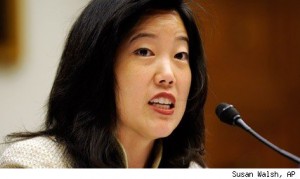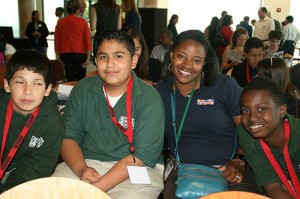Working Together for Education Reform: Reflections on a Michelle Rhee Lecture
Greg Beach is a First Year Teaching Fellow at the Edwards Middle School in Charlestown, MA
In the vast education reform brainstorm, it is difficult to determine the solutions from the snake oil. Politicians capitalize on the “education crisis”, politicizing a public good that should be free from partisan bickering. Corporate interests, labor interests, special interests all have their say while the voices of students, parents, and educators are often muted in the crowd. The conversation can quickly become a confusing cacophony to the concerned citizen.
In the absence of clarity, one may turn to preconceived notions to guide their thinking. All too often, I have fallen into this category of thought. However, I mustn’t be so closed minded. I am informed by my experiences yet there is still so much more to know. The more you know, the more you know how much you do not know. Becoming a Teaching Fellow and a Masters student has pushed me to expand my thinking and to not impulsively draw conclusions, especially in the complex realm of education policy. If I truly believe that education policy must be depoliticized, I should start with by expanding my own thinking on the matter.
In pursuit of a broader mindset, I jumped at the opportunity to attend a recent lecture given by Michelle Rhee at Boston’s Symphony Hall. A fellow Teaching Fellow at the Edwards Middle School, and Rhee supporter, was gracious enough to offer me a ticket to the lecture. Though I am no Rhee fan, I knew that this would be a valuable experience and gladly attended.
Rhee began her speech by commenting that when you push for great change, you are bound to ruffle a few feathers. She conceded that her biggest failing during her tenure as DC schools chancellor was her inability to communicate and connect to the communities that were being affected by her reforms. This is something that I’ve felt about Rhee, who once infamously commented that “that cooperation, collaboration and consensus-building are way overrated.” Her ambitious and disruptive policies, which included closing 15% of DC public schools during her tenure, appear authoritarian. Although these changes were ostensibly implemented for the long-term greater good, her lack of communication branded her a dictator with little regard to those affected by the reform.
It was refreshing to hear Rhee admit her mistakes. However, following the lecture, I was no convert to the Rhee doctrine. I still view her as a policymaker who is too unilateral in her approach, too headstrong in her excessive pace of reform without fully considering the implications of her system. However, despite my continued disagreement with Rhee, I’ve grown to appreciate her as a figure in education reform. I cannot view her as the enemy, as an appendage of the corporate-state. This demonization does not advance the conversation that must be centered on expanding academic opportunity and achievement.
Her admission that better communication is needed should serve as a model for us all. As we push forward in our collective effort to build a high quality, 21st century education system, we must understand the importance of open, inclusive discussion. As Rhee stated in her lecture, there is no silver bullet or magic solution to fix the system. We must be open-minded and respectful of those who bring their passion and dedication to this important debate. If we become mired in divisive conflict, we will fail and in our failure, the students are the ones who will suffer the most.
Share your thoughts on the education reform debate and how we can best serve students in the comments section.

